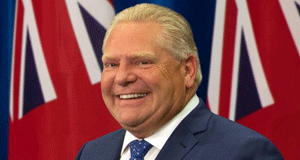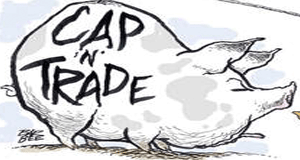“I’ll put more money in your pocket.”
It’s a promise that Doug Ford made repeatedly during the campaign, and now that he is taking the reins of power, it’s a promise he needs to follow through on. Ontario has become an increasingly expensive place to live, and premier-elect Ford’s decisive victory shows that his message of saving taxpayer money is one that resonated with voters.
Polls have shown that taxes were the third most important election issue for voters, after health care and the economy. Ford is going to have to follow through, even if it means finding more savings than originally planned. Tax cuts cannot come at the expense of running the type of massive deficits that the outgoing Liberals were roundly and rightly condemned for by voters. The new government must commit to both saving taxpayers money and to achieving a balanced budget within their new mandate.
These tax savings must start with cutting former Ontario Premier Kathleen Wynne’s cap-and-trade carbon tax.
When Ford entered the Progressive Conservative leadership race, he signalled his staunch opposition to the Ontario carbon tax plan supported by Patrick Brown under his PC platform. Ford has been unequivocal in his opposition to this type of tax, quickly and publicly signing the Canadian Taxpayers Federation’s pledge to not enact an Ontario carbon tax, to eliminate the existing cap-and-trade tax imposed by Wynne, and also to fight a federally imposed carbon tax. This is a pivotal issue among the conservative voters whose vote helped Ford into power, and has implications beyond Ontario.
The cap-and-trade carbon tax is such a significant issue because when it was implemented, it gave the government a new taxing power in a political climate where the government has treated taxpayers’ money with very little respect. Pro-carbon tax politicians explicitly commit to increasing the carbon tax over time, leading to more and more overreach. The federal government has said the tax needs to be higher, and set a goal of a $50 per tonne carbon tax by 2020. This is a dramatic increase from Ontario’s most recent carbon credit price of $14.65 per tonne.
Withdrawal from cap-and-trade regimes has happened before in other jurisdictions, and can be achieved simply.
New Jersey was previously a member of a cap-and-trade program for power plants, called the Regional Greenhouse Gas Initiative (RGGI). That scheme required power plants in participating states to buy permits for the carbon dioxide they emit. Electricity generators in RGGI ultimately passed the increased costs of the scheme on to consumers. Six RGGI states are ranked within America’s top 10 highest retail electricity rates, and electricity rates in those states rose faster than the national average — 52 per cent since 2005.
When Chris Christie was governor in 2011, he pulled New Jersey out of the scheme, ending a tax that had cost New Jersey consumers $113 million.Where the RGGI cap-and-trade regime has remained in place, the tax has cost consumers in those states nearly $2.9 billion.
New Jersey’s withdrawal from RGGI shows us what is possible with political will. Withdrawing Ontario from the our cap-and-trade scheme could happen in a straightforward manner, and could simply mean waiting. The government could allow existing carbon credits to expire, and not issue any more.
The success of the second part of Ford’s carbon tax pledge — to fight the federal government — will in part lay with the courts. Ford committed to joining with Saskatchewan Premier Scott Moe to fight Prime Minister Justin Trudeau’s federal carbon tax with a constitutional challenge. This could mean either by bringing Ontario’s own constitutional challenge of the federal law or joining with Saskatchewan as an intervener.
But while the courts will decide the constitutionality of the federal law, the fight will largely be a political one. Until recently, Saskatchewan Premier Scott Moe (and Premier Brad Wall before him) was alone in the wilderness in his fight against Trudeau. He now has an important ally in premier-elect Ford, and may soon also have one in Premier Jason Kenney in Alberta.
Prime Minister Trudeau would be a fool to underestimate the power of these three provinces in leading a forceful opposition against his plans to impose a federal carbon tax. Even if the law is upheld by the courts, it could fail at the ballot box as a result of a concerted campaign against it by Moe, Ford and Kenney.
Premier-elect Ford pledged early and eagerly to end the carbon tax, and give taxpayers money back in their pockets. Killing the carbon tax is the most important first move he can take in showing the people who elected him that he is serious.
— Christine Van Geyn Ontario Director of the Canadian Taxpayers Federation
This article was previously published by the Huffington Post
 TheBulletin.ca Journal of Downtown Toronto
TheBulletin.ca Journal of Downtown Toronto


